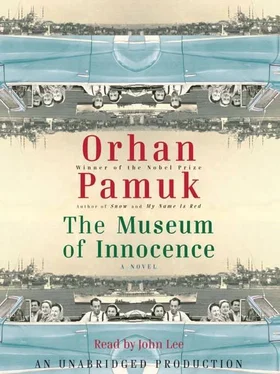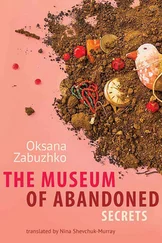Feridun’s eyes betrayed his own jealousy, though small, of the happiness Füsun and I had before us. But during that long final lunch at the Divan Hotel, we plied ourselves with enough raki to relax us; and so after ironing out the details of transferring full rights to Lemon Films to Feridun’s name, we were able to turn to another subject that soothed and charmed us both: Feridun was soon to start shooting his art film, Blue Rain .
I’d drunk so much that with an unsteady gait I went straight home, without even stopping off at Satsat, and immediately fell into bed. I remember remarking to my worried mother when she came to check on me, before dropping off, “Life is beautiful!” Two days later, on an evening when the skies were ripped open by thunder and lightning, Çetin drove my mother and me to Çukurcuma. My mother pretended to have forgotten her refusal to attend Tarık Bey’s funeral, and being agitated, as she always was on such occasions, she did not stop talking the whole way. “Oh, look how nicely they’ve done those sidewalks,” she said as we came closer to Füsun’s house. “I’ve always wanted to see this neighborhood. What a lovely hill that is. What nice snug places they seem to have here.” As we entered the house, a cool wind swept up the dust from the cobblestones, presaging rain.
My mother had previously telephoned Aunt Nesibe with her sympathies, and the two women had met a few times. And yet this visit to ask for Füsun’s hand seemed at first to be a condolence call, the occasion to express our regrets at Tarık Bey’s passing. But everyone felt that the regrets expressed went far deeper. After the requisite pleasantries and formalities (“How lovely it is here. Oh how I’ve missed you. I can’t tell you how sad we were to hear…”) Aunt Nesibe and my mother embraced and began to cry, whereupon Füsun fled the room, running upstairs.
When a lightning bolt struck somewhere nearby, the two women released each other and straightened up. “Dear God!” my mother said. Then, as the rain came pouring down and the sky continued to rumble, the twenty-seven-year-old divorcée brought us coffee on a tray that she carried as daintily as any eighteen-year-old who has just entered society. “Nesibe, Füsun is your spitting image!” said my mother. “How clever and knowing she looks when she smiles. What a beauty she’s become!”
“No, she is much more intelligent than I am,” said Aunt Nesibe.
“Mümtaz, may he rest in peace, he always used to say that Osman and Kemal were more intelligent than he was, but I was never sure he believed it. Who says the younger generation must have more brains than we do?” my mother said.
“The girls are certainly smarter,” said Aunt Nesibe. “Did you know, Vecihe”-for some reason, she was unable to, or wouldn’t, address her as “Sister Vecihe” in her old reverential way-“what I regret most in life?” She went on to tell how for a long time she’d dreamed of opening a shop and making a name for herself, but could never find the courage, only to live to see “people who don’t even know how to hold a pair of scissors or sew a stitch now own the finest fashion houses.”
Together we went to the window to watch the rain and the runoff pouring down the hill.
“Tarık Bey, may he rest in peace, was very fond of Kemal,” said Aunt Nesibe as she sat down at the table. “Every evening he’d say, ‘Let’s wait a little longer. Kemal Bey might be coming.’”
I could tell that my mother did not care for these words at all.
“Kemal knows his mind,” said my mother.
“Füsun knows what she wants, too,” said Aunt Nesibe.
“They’ve already made their decision,” said my mother.
But that was as close as my mother got to asking Aunt Nesibe for her daughter’s hand.
Aunt Nesibe and Füsun and I each drank our usual glass of raki; my mother drank only rarely, but she asked for a glass, too, and after two sips turned cheerful-not so much because of the effect of ingesting the raki itself, but because of the fragrance, as my father used to say. She recalled the days when she and Nesibe had stayed up until dawn to complete an evening gown. They both enjoyed reminiscing about the weddings and dresses of that era.
“Vecihe’s pleated dress was so celebrated that afterward other women in Nişantaşı asked to have an identical one made for them. Some of them even bought the same material in Paris, placing it right on my lap, for me to sew, but I refused,” said Aunt Nesibe.
When Füsun rose ceremoniously from the table and went over to Lemon’s cage, I got up, too.
“For God’s sake, don’t bother with that bird while we’re still eating!” my mother cried. “Don’t worry, you have plenty of time left to spend together… Stop, stop right there, I’m not letting either of you back at the table until you’ve washed your hands.”
I went upstairs to wash, and Füsun, who could have washed her hands downstairs in the kitchen, followed me up. At the top of the stairs I took her by the arms and kissed her passionately. It was a deep and mature kiss, lasting ten or twelve seconds. Nine years ago we had kissed like children. But there was nothing childish about this kiss, with its slow, powerful soulfulness. Then Füsun went downstairs ahead of me, at a run.
We got through supper with little further merriment, and keeping a close watch on what we said; as soon as the rain had let up, we left.
“Mother dear, you forgot to ask for the girl’s hand,” I said, as we were driving home in the car.
“How often did you go over there, all these years?” my mother asked. When she saw me at a loss for words, she snapped, “Whatever is done, is done… But Nesibe said one thing that really hurt. Maybe it’s because you hardly ever stayed in to eat supper with your mother that it broke my heart to hear it.” She stroked my arm. “But don’t worry, my son, I didn’t mind. Even so, I just couldn’t bring myself to ask for her hand, as if she were still a lycée girl. She’s been married and divorced; she’s a full-grown woman. She has a head on her shoulders, and she knows what she’s doing. You two have talked everything over and agreed on everything. So why the need for all the pomp and ceremony? If you ask me, even an engagement is unnecessary… Stop prolonging things and creating fodder for gossips-just get married… Don’t bother going to Europe, either; these days you can find everything you want in the shops in Nişantaşı, so what’s the point of trudging over to Paris?”
Seeing my determined silence, she closed the subject.
When we got home, before going to bed, my mother said, “You were right, though. She’s a beautiful woman, and intelligent. She’ll be a good wife for you. But be careful, she looks as if she’s suffered a great deal. I may not know the half of it, but take care not to let the anger, the grudge, whatever it is she’s harboring inside her, poison your life.”
“It won’t!”
Quite to the contrary, with every day, the bond between us grew stronger, and with it our attachment to life, to Istanbul, its streets, its people, and all else. Sometimes while holding hands in a cinema, I would feel a light shiver passing through her. Sometimes she would lean into me, or even rest her head gently on my shoulder. She would sink into her seat to get closer, and I would take her hands between mine, sometimes stroking her leg, like a feather’s touch. During the first weeks Füsun had not liked sitting in a box, but now she didn’t object. Holding her hand allowed me to measure her reflexive responses to the film, just as a doctor might with the tips of his fingers probe a patient’s innermost parts, and I drew enormous pleasure from taking the pulse of her emotional responses to the film.
Читать дальше












